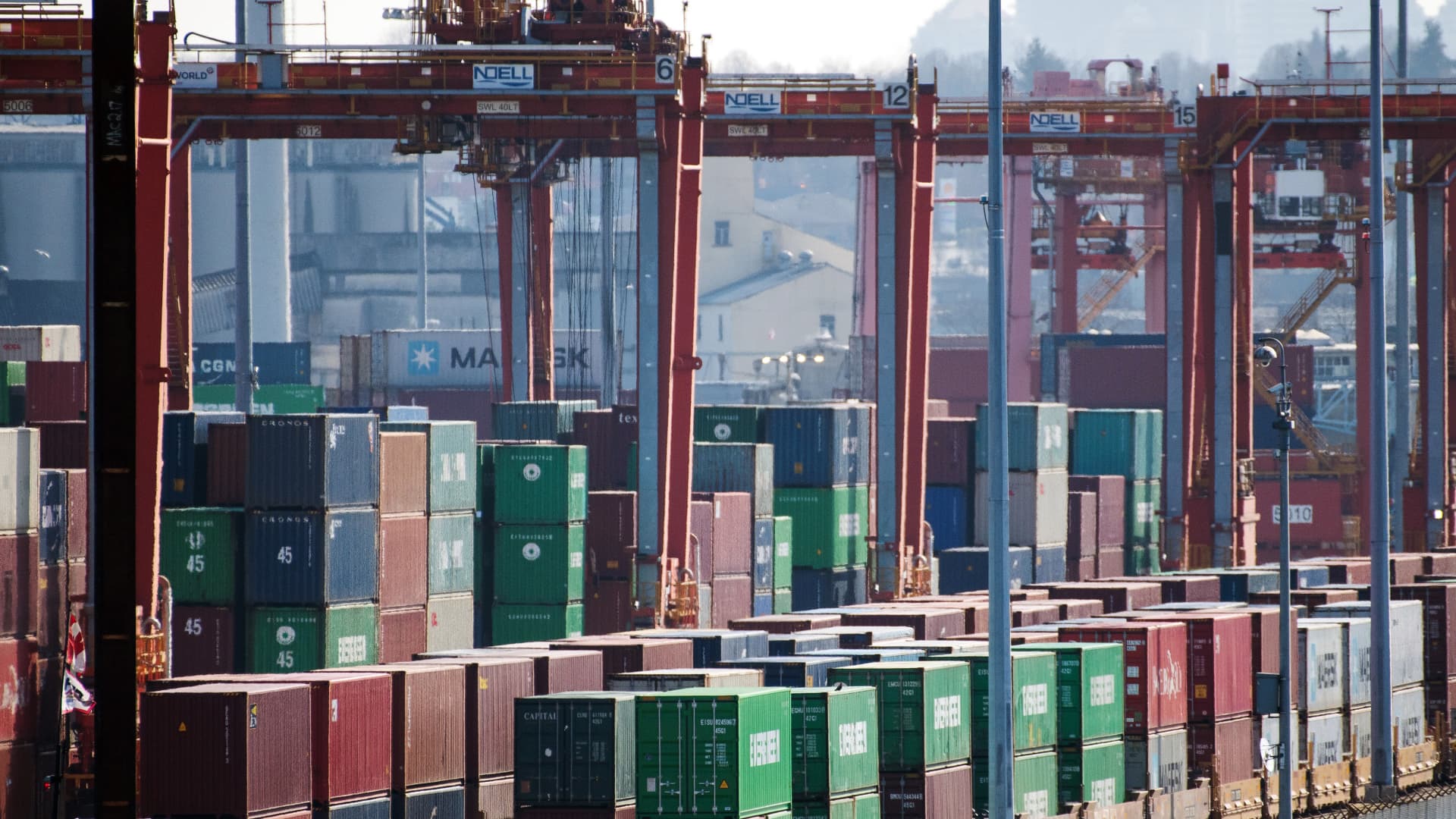Shipping containers are being loaded onto rail cars at the Global Container Terminals Vanterm container terminal on Vancouver Harbour in Vancouver, British Columbia, Canada.
Bloomberg | Bloomberg | Getty Images
Members of the International Longshore and Warehouse Union (ILWU) of Canada have voted to ratify the second tentative agreement with West Coast port ownership, bringing an end to the uncertainty and trade congestion that has been impacting the supply chain for several weeks due to the strike by dock workers.
Rob Ashton, president of the ILWU, reported that 74.66% of members voted in favor of accepting the terms of the tentative agreement.
Last Sunday, the ILWU Canada and the British Columbia Maritime Employers Association (BCMEA) announced a revised second tentative deal, which was brokered by the Canada Industrial Relations Board after the initial proposal was rejected by the union members. The industrial relations board instructed the union to vote by Friday.
The new deal includes increases in wages, benefits, and training, according to a statement released by the BCMEA. However, no specific details were provided.
The original proposal, which was rejected, included a compounded wage increase of 19.2% over four years, as well as a signing bonus of $1.48 per hour per employee and an 18.5% increase in retirement payout, according to disclosures from the BCMEA.
The union argued that worker salaries were unsustainable given rising inflation, while the BCMEA claimed that longshore wages have increased by 40% in the past 13 years, exceeding inflation at 30%. The use of contract labor for maintenance work was another point of contention in the negotiations.
The ratification of the agreement is expected to bring certainty and stability to Canada’s West Coast ports, according to the BCMEA.
However, Paul Brashier, vice president of drayage at ITS Logistics, expressed concerns about the lasting damage to the reliability and reputation of Canadian ports. He reported that many shipping clients have made the decision to permanently move their imports back to U.S. ports due to the lack of government intervention and direction.
During the 14-day strike, ocean carriers diverted their vessels to U.S. ports or reconsigned the destination of their containers. Some ocean carriers eventually returned to the Canadian ports and waited to unload both Canadian and U.S. freight.
Canadian Labor Minister Seamus O’Regan acknowledged the supply chain damage caused by the strikes and called for a review of the events to prevent such disruptions in the future.
Supply chain delays expected to persist for months
It is estimated that it will take at least two months for the railroads to clear the backlog of containers resulting from the 14-day strike by dock workers. At the peak of the strike, approximately $12 billion worth of freight was stranded on the water, with some trade being diverted to U.S. ports.
The Railway Association of Canada initially projected that it would take three to five days for networks and supply chains to recover for each day the strike lasted. However, after the strike ended, delays for rail containers were estimated to range from 39 to 70 days.
A spokesperson for the Railway Association of Canada stated that delays are trending toward the higher end of that range.
The changes in vessel routes have impacted the profitability of Canadian Pacific Kansas City and Canadian National Railway, as fewer containers can be unloaded at U.S. ports. On the other hand, U.S. trucking companies and railroads, such as BNSF (a subsidiary of Berkshire Hathaway) and Union Pacific, are expected to benefit from the additional containers coming into U.S. ports. Furthermore, if Canadian trade is rerouted to the East Coast, Norfolk Southern and CSX would also benefit.
The flow of railroad trade from Canada to the U.S. was reduced by 82% during the first two weeks of the strike, but it has gradually recovered with a 6.2% decrease for the week ending July 29.
Railroad companies have already experienced financial losses due to the supply chain issues. Canadian Pacific Kansas City estimated that the labor unrest will negatively impact its revenue by $80 million, but the company is aiming to recover these losses in the third and fourth quarters. Canadian National Railway has increased its train services to expedite the clearing of container congestion.
The timing of this strike during the peak shipping season for back-to-school and holiday items has further exacerbated the supply chain disruptions.
Denial of responsibility! VigourTimes is an automatic aggregator of Global media. In each content, the hyperlink to the primary source is specified. All trademarks belong to their rightful owners, and all materials to their authors. For any complaint, please reach us at – [email protected]. We will take necessary action within 24 hours.


